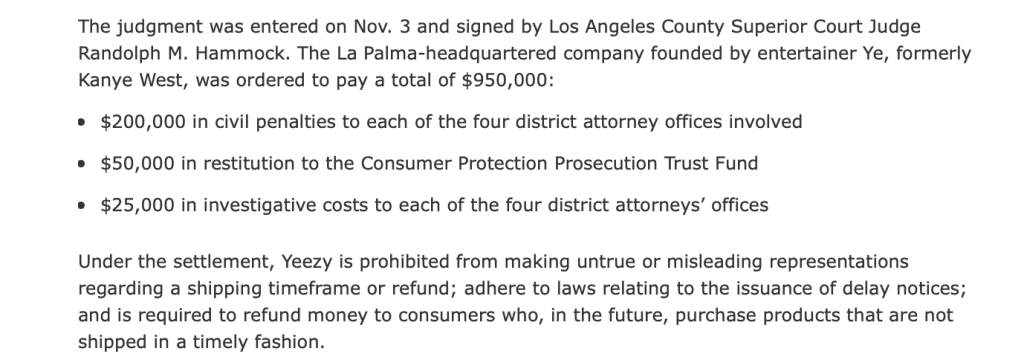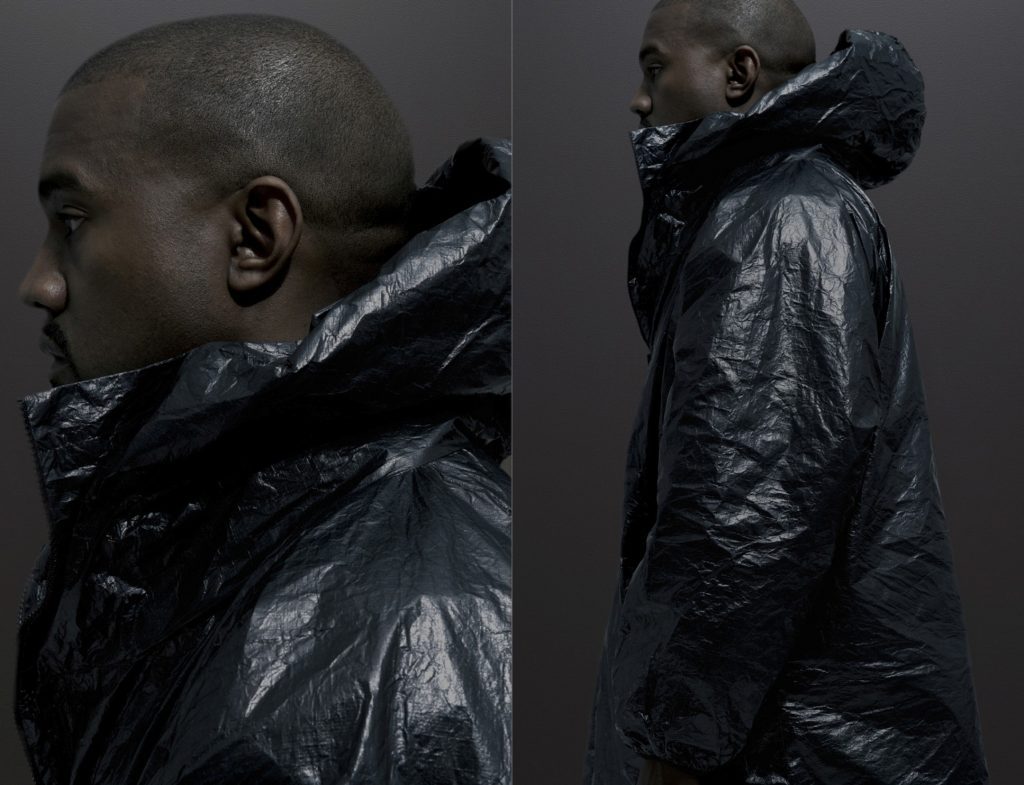Forget Yeezy’s multi-faceted fight with Walmart for a minute. Kanye West’s brand is now facing off against the State of California, too, thanks to a new lawsuit that accuses the “high-end sneaker and retail clothing business” of violating state consumer protection laws that require online orders to be shipped within a certain time frame unless otherwise specified. According to a newly-filed complaint, a handful of California District Attorneys claim on behalf of the people of California that Yeezy Apparel, which sells “shoes and other apparel over the Internet via their website, www.yeezvsupply.com,” has repeatedly run afoul of California law by “failing to ship items within 30 days and failing to provide adequate delay notices to California consumers, or provide [them with] an offer of a refund.”
Setting the stage in the complaint, which was filed in the Superior Court of California, County of Los Angeles on October 22, the California state plaintiffs assert that “a variety of consumer protection statutes govern sales made to consumers in the State of California on the basis of orders placed over the Internet, including Business and Professions Code section 17538,” which requires that orders for goods or services placed over the internet “be shipped within 30 days [of that order being placed].” Should a company fail to meet that shipping deadline, the law mandates that the company must either: “provide a refund, send equivalent or superior replacement goods, or provide the buyer with a [specific] written notice regarding the delay,” with that notice containing information, including “the expected duration of the delay and an offer of a refund, upon request,” among other things.
Yeezy apparently failed to ship orders placed on the Yeezy Supply site on time and thereafter, did not provide adequate delay notices to California consumers, or provide them with the opportunity to get a refund on the unshipped goods. In addition to failing to ship orders on time, the plaintiffs allege that Yeezy Apparel further violated California state law by making “untrue or misleading statements regarding its ability to ship products within a certain timeframe, particularly where customers paid an additional charge for expedited shipping,” and also “advertising goods for sale without disclosing logistical limitations to consumers.” Among the problematic statements made by Yeezy where those in which the company warranted that it “could ship products to customers within a certain timeframe,” when it knew or should have known that the statements were either “untrue or misleading and likely to deceive members of the public.”
With the foregoing in mind, the plaintiffs set out claims of against Yeezy of unfair competition and false advertising, and are seeking injunctive relief to permanently prevent the company from engaging in such behavior going forward, as well as an unspecified sum of monetary damages.
The complaint does not set out a timeline for Yeezy’s alleged violations, and thus, there is no definitive tie between Yeezy’s failure to ship products to consumers on time and the sweeping supply chain and shipping disruptions that are currently underway in the U.S. and beyond. The complaint states that the actions at issue began “on an unknown date but at least within the four years prior to the filing of this Complaint.” It would, of course, not be surprising if such shipping-specific allegations come in connection with the current strain on businesses.
As the Washington Post reported last week, “Container ships are clogging ports, awaiting cargo or unable to get past the gridlock to unload their goods,” which range from toys and apparel and sneakers and electronics. All the while, “Some factories have gone dark, lacking raw materials and hands to run machines,” further compounding the issue for global brands. Consumers have been warned to expect delays, limited inventory, higher prices, and a lack of holiday sales this year as a result, and brands have been forced to rethink their operations, and in particular, the value – and the downsides – of their often-overarching reliance of far-reaching supply chains.
It is worth noting that while the current supply chain catastrophe very well may have a hand in Yeezy’s alleged issues, this case is not the first of its kind. In fact, before the onset of the global shipping strain, fast Fashion Nova landed on the receiving end of a complaint from the U.S. Federal Trade Commission (“FTC”) for allegedly violating the agency’s Mail, Internet, Or Telephone Order Merchandise Rule (“Mail Order Rule”) when it did not ship orders that consumers placed on its e-commerce site within the estimated time frame it provided to consumers.
According to the FTC’s complaint, Fashion Nova specifically violated the Mail Order Rule by making “clear promises to consumers for years that they offer fast shipping of their products, including [by] using phrases like ‘Fast Shipping,’ ‘2-Day Shipping,’ and ‘Expect Your Items Quick!,’” when the company had a history of “regularly fail[ing] to meet its shipping promises to consumers, and fail[ing] to meet the requirement that consumers be notified of shipping delays and given the chance to cancel orders and receive prompt refunds.”
The FTC also alleged that at times, the California-based fast fashion company failed to refund consumers for the items that it did not ship, and instead, issued gift cards, which are not considered refunds under the Mail Order Rule. Still yet, the company also (allegedly) failed to cancel orders and provide refunds when it did not offer consumers delay option notices.
Fashion Nova and the FTC ultimately reached a settlement in March 2020 in furtherance of which the retail agreed to pay some $6.5 million to customers impacted by its violations of the law.
Regardless of the circumstances behind Yeezy’s alleged breaches of the law, the lawsuit should serve as a reminder to brands to reacquaint themselves with both California law and the Mail Order Rule, the latter of which can result in civil penalties of up to $43,280 per violation, restitution and/or injunctive relief, and act accordingly in order remain in compliance and avoid legal action. Companies should pay extra close attention to this area not only in light of the state of shipping delays at the moment, but given the rising number of actions that are being initiated in connection with failures to abide by laws like the Mail Order Rule.
Reflecting on Fashion Nova’s settlement last year, Fredrikson & Byron PA attorneys Courtney Thompson and Jacob Abdo asserted that the “unprecedented fine suggests that the FTC may zealously enforce the Mail Order Rule against online retailers going forward,” which means that “delays caused by workforce shortages, supply chain disruptions and bad business practices may give rise to unanticipated (and costly) liability.” The recently-initiated case against Yeezy only seems to bolster this prediction.
UPDATED (Nov. 9, 2021): Los Angeles County District Attorney George Gascón announced that Yeezy Apparel LLC and Yeezy LLC will pay $950,000 to settle the civil suit accusing them of engaging in “unlawful business practices and false advertising by failing to ship items in a timely manner.” Consumers “are entitled to protection against unwarranted fees and unreasonably long waits for [online] purchases to arrive on their doorsteps,” District Attorney Gascón said. “We will enforce state and federal laws governing online shopping in Los Angeles County.”

The case is The People of the State of California v. Yeezy Apparel LLC, et al., 21STCV38971 (Cal.Sup.)













